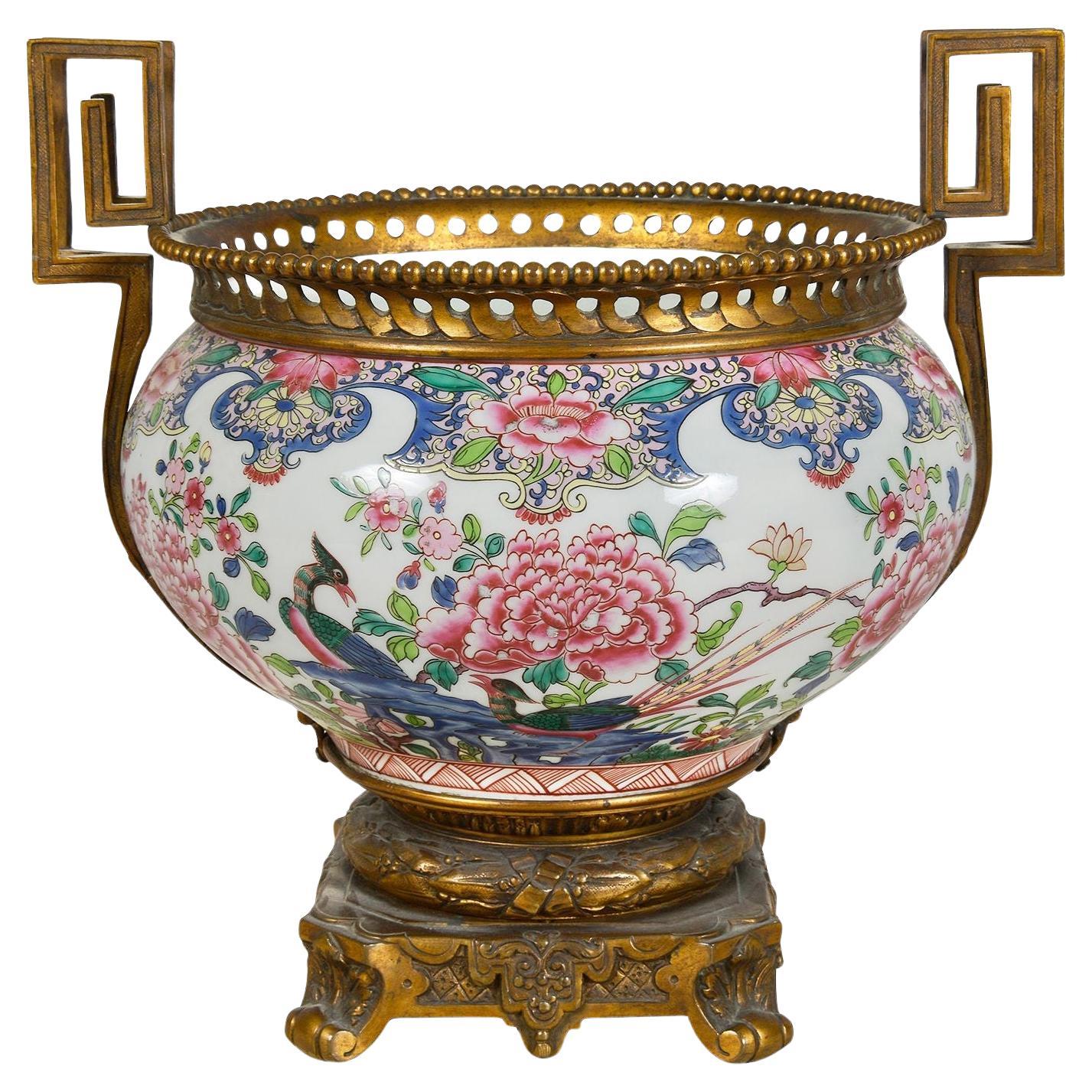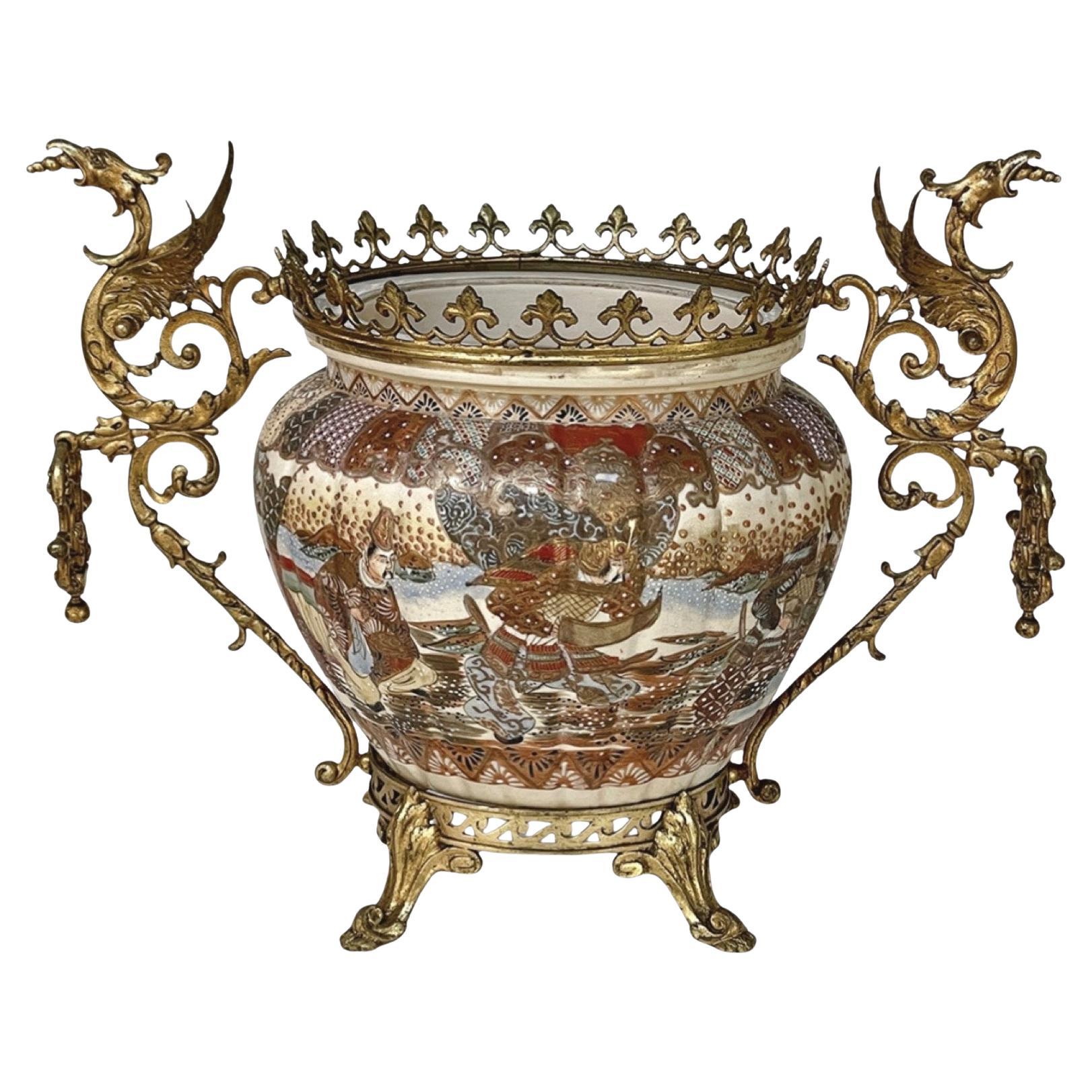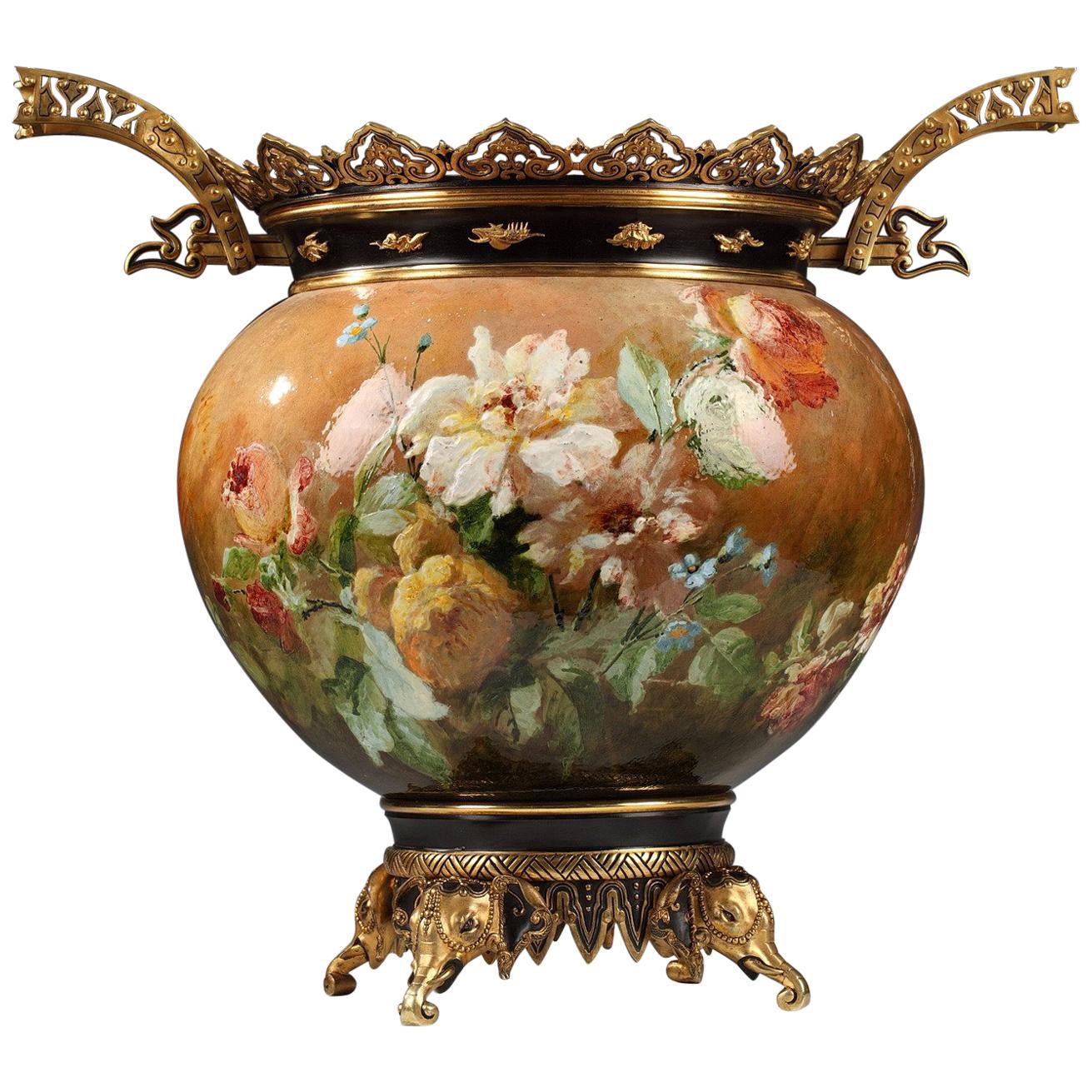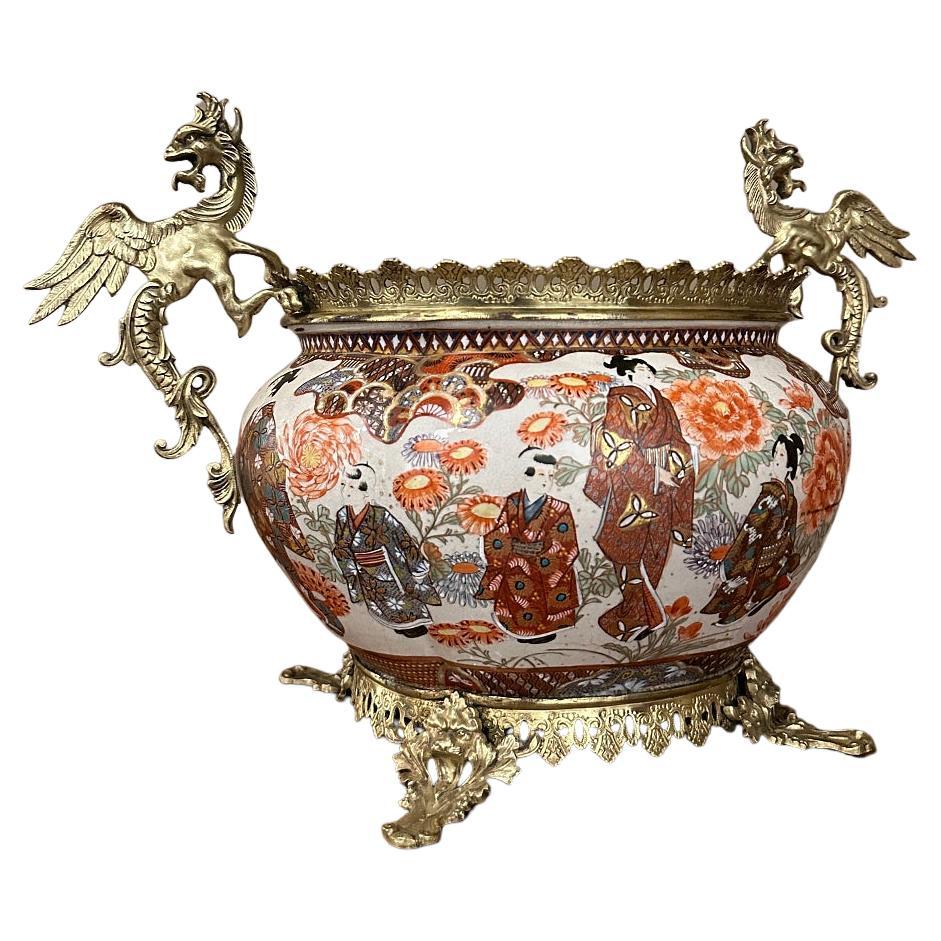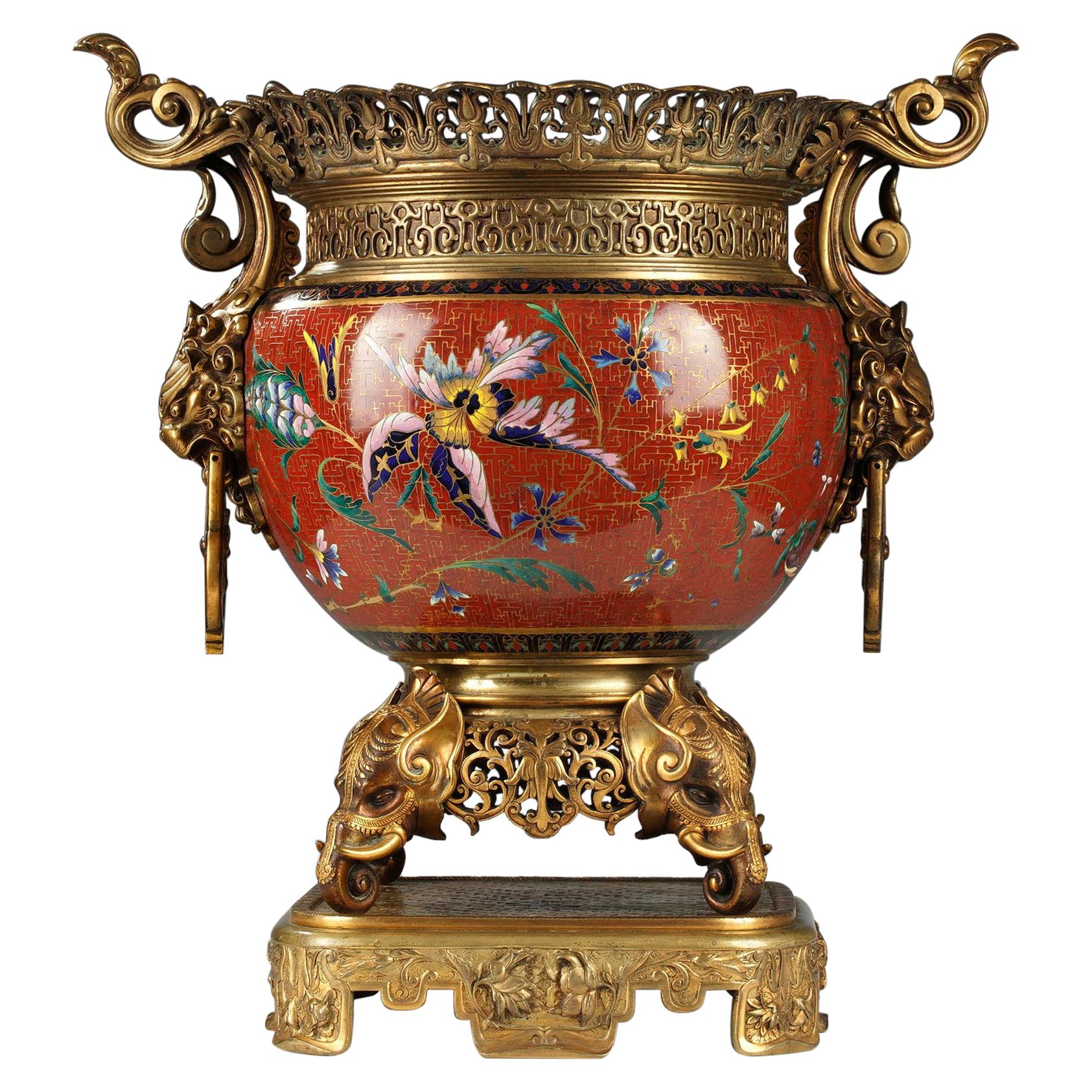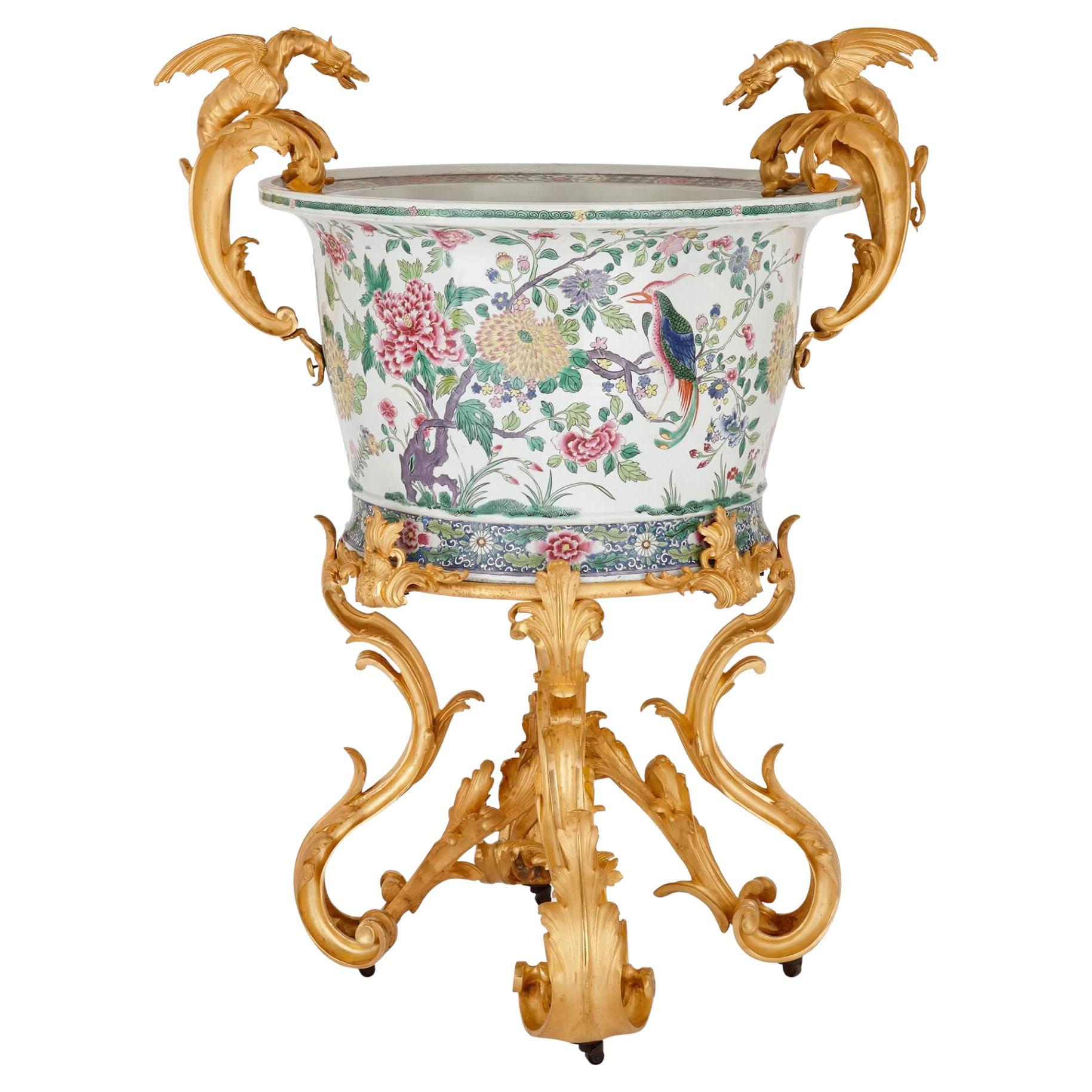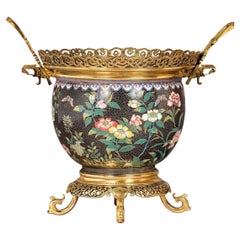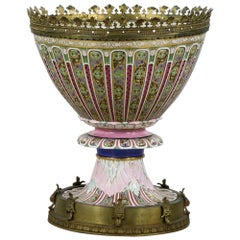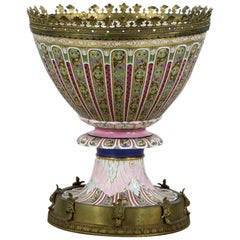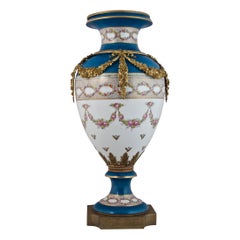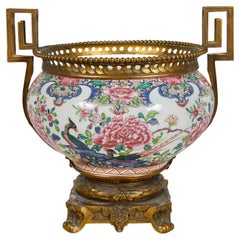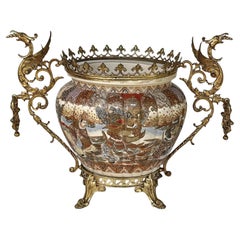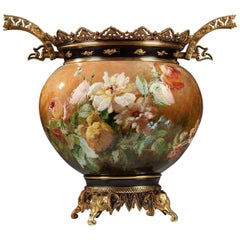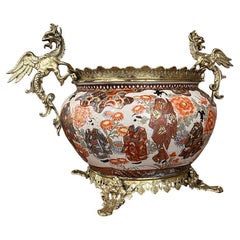Items Similar to Japonisme Jardinière by Haviland & Co att. to Alexandre Dammouse
Video Loading
Want more images or videos?
Request additional images or videos from the seller
1 of 8
Japonisme Jardinière by Haviland & Co att. to Alexandre Dammouse
$9,500
£7,251.92
€8,336.57
CA$13,368.20
A$14,865.99
CHF 7,807.94
MX$181,751.66
NOK 97,294.42
SEK 91,722.36
DKK 62,217.75
About the Item
Japonisme stoneware and bronze jardinière attributed to Édouard-Alexandre Dammouse for Haviland & Co, with bronze mounts attributed to the F . Barbedienne foundry.
Based on the principles of the British Arts and Crafts movement, Art Nouveau artists sought to reform the decorative arts by emphasizing uniqueness and a return to craftsmanship. Artist-potters found inspiration in Asian ceramics, particularly Japanese stoneware (a hard, dense type of pottery), which was shown in 1878 at the Exposition Universelle in Paris, as well as in the forms, glazes, and techniques of Chinese porcelain and pottery. They also looked to European traditions such as the rustic salt-glazed stoneware of the sixteenth and seventeenth centuries and Gothic sculpture and architecture. In the process they created works of ceramic art that were entirely modern and new.
Origin: French, Paris
Date: Late 19th-century, Circa 1880's
Dimensions: 16in H x 17in W x 13in D
Produced by Haviland & Company - stamped with their H & Co rosary stamp on the bottom
Founded in 1864, Haviland & Co. consistently pushed boundaries in their industry under the leadership of Charles Haviland (1839-1921) and initiated a revolution in porcelain decoration in the 1870s thanks to artistic director Félix Bracquemond’s use of chromolithography on ceramics. Bracquemond also initiated collaborations with various artists including the brothers Edouard-Alexandre and Albert-Louis Dammouse, Felix Lafond, and Edouard Lindeneher, a wise decision that would bear even more impressive artistic fruit the following decade. In 1874, Haviland purchased the secrets to renowned ceramist Ernest Chaplet’s recently developed barbotine technique and, the following year, hired Chaplet to further develop the ware at the company’s experimental studio in Auteuil.
Chaplet’s reputation at Haviland was such that, when high production costs forced the company to close the Auteuil studio in 1881, he convinced the firm to open another atelier on the Rue Blomet, Vaugirard in Paris. For the next several years, Chaplet oversaw the creation of a wide variety of wares. He was an adherent to Arts and Crafts philosophies and believed strongly in fostering a creative atmosphere in which a single artisan is responsible for both the design and execution of an object. Similar to Bracquemond before him, Chaplet collaborated with about 20 artists, chief among them the Dammouse brothers and Ringel d'Illzach, with whom he produced stoneware and experimental porcelain. The resulting vases and sculptures ranged from red-brown stoneware with incised Japonesque decoration, colored slips, enamels, and gilding, to oxblood-glazed porcelain vases and figurines.
Beyond his leadership and collaborative efforts, it was at the Vaugirard studio that Chaplet—with chemist Lebrun de Rabot—finally succeeded in reproducing the elusive sang-de-boeuf (oxblood) glaze he had seen on medieval Chinese ceramics. In 1886, economic difficulties forced Haviland to cease production at all locations except his Limoges factory. Chaplet acquired the Rue Blomet studio, which he then ceded in 1897 to fellow ceramist extraordinaire, Auguste Delaherche. Chaplet went on to make his own, indelible mark on the industry, but his tenure at Haviland’s experimental ateliers remain some of the most influential and stylistically diverse in the history of Western ceramics.
- Creator:Haviland & Co. (Maker)
- Dimensions:Height: 16 in (40.64 cm)Width: 17 in (43.18 cm)Depth: 13 in (33.02 cm)
- Style:Japonisme (Of the Period)
- Materials and Techniques:
- Period:
- Date of Manufacture:circa 1880's
- Condition:In beautiful antique condition.
- Seller Location:New York, NY
- Reference Number:Seller: DA113023-011stDibs: LU4745237568662
About the Seller
5.0
Vetted Professional Seller
Every seller passes strict standards for authenticity and reliability
Established in 1986
1stDibs seller since 2019
52 sales on 1stDibs
Typical response time: 7 hours
- ShippingRetrieving quote...Shipping from: New York, NY
- Return Policy
Authenticity Guarantee
In the unlikely event there’s an issue with an item’s authenticity, contact us within 1 year for a full refund. DetailsMoney-Back Guarantee
If your item is not as described, is damaged in transit, or does not arrive, contact us within 7 days for a full refund. Details24-Hour Cancellation
You have a 24-hour grace period in which to reconsider your purchase, with no questions asked.Vetted Professional Sellers
Our world-class sellers must adhere to strict standards for service and quality, maintaining the integrity of our listings.Price-Match Guarantee
If you find that a seller listed the same item for a lower price elsewhere, we’ll match it.Trusted Global Delivery
Our best-in-class carrier network provides specialized shipping options worldwide, including custom delivery.More From This Seller
View AllJaponisme Ormolu and Cloisonne Enamel Jardiniere by Ferdinand Barbedienne
By Ferdinand Barbedienne, F. Barbedienne Foundry
Located in New York, NY
A dual-handled jardinière with black cloisonne ornamented with flowers, butterflies and foliage.
Origin: France, Paris
Date: Last quarter of the 19th Century
Stamped F. BARBEDI...
Category
Antique Late 19th Century French Japonisme Planters, Cachepots and Jardi...
Materials
Bronze, Enamel
19th Century Monumental French Porcelain Urn
Located in New York, NY
Highly collectable hand decorated, with bronze leaf border design on top.
Date: circa 1890
Origin: French
Dimension: 29 in x 26 in.
Category
Antique Late 19th Century French Vases
Materials
Bronze
Rare Monumental 19th Century French Porcelain Urn Centerpiece
Located in New York, NY
A rare monumental 19th century French Porcelain Urn centerpiece
Highly collectable hand decorated, with bronze leaf border design ...
Category
Antique 19th Century French Centerpieces
Materials
Bronze
Late 19th Century French Sèvres-Style Ormolu-Mounted Porcelain Vase
Located in New York, NY
A Fine quality Sèvres-style ormolu-mounted porcelain bleu vase. The oviform vase flanked by ormolu garlands, finely painted floral design.
Date: Late 19th century
Origin: French
...
Category
Antique Late 19th Century French Vases
Materials
Ormolu
Napoleon III Gilt-Bronze and Cloisonné Enamel Jardinière on White Onyx Base
Located in New York, NY
Napoleon III Gilt-Bronze and Cloisonné Enamel Jardinière on White Onyx Base
This oval form jardinière is wrapped with black, white and gold cloisonné enamel, with a shield at the ...
Category
Antique Late 19th Century Napoleon III Planters, Cachepots and Jardinières
Materials
Onyx, Bronze, Enamel
A Renaissance Revival Onyx and Champlevé Planter with Cloisonné Enamel Urns
Located in New York, NY
A very fine quality renaissance revival gilt-bronze and champlevé planter, with oval bowl and caryatid handles, a regal mask head to either side and ...
Category
Antique Mid-19th Century French Renaissance Revival Planters, Cachepots ...
Materials
Onyx, Bronze, Enamel, Gold Leaf
You May Also Like
Famille Rose style Jardiniere, C19th
By Samson Porcelain Factory 1
Located in Brighton, Sussex
This exquisite late 19th-century jardinière exemplifies the Samson famille rose style, renowned for its vibrant colours and intricate floral motifs. Crafted from fine porcelain, it f...
Category
Antique Late 19th Century French Chinese Export Planters, Cachepots and ...
Materials
Ormolu
19th Century Bronze Mounted Satsuma Jardiniere
Located in Dallas, TX
19th Century bronze mounted satsuma jardiniere is a splendidly preserved artifact from a wonderful period in French history! The porcelain bowls wer...
Category
Antique 1880s French Meiji Planters, Cachepots and Jardinières
Materials
Bronze
Earthenware Planter attr. to F. Barbedienne, France, Circa 1880
By Ferdinand Barbedienne
Located in PARIS, FR
Marked M.s.L. et G.S.
Planter in earthenware of Montigny-sur-Loing decorated with painted flowers (so-called "à la barbotine") inserted in a blanc and gilded bronze mount, attrib...
Category
Antique 1880s French Planters, Cachepots and Jardinières
Materials
Bronze
19th Century Japanese Satsuma Vase ~ Jardiniere with Bronze Mounts
Located in Dallas, TX
19th century Japanese Satsuma Vase ~ Jardiniere with Bronze Mounts is an amazing work of art with scenes hand-painted around the en...
Category
Antique 1890s Japanese Japonisme Planters, Cachepots and Jardinières
Materials
Bronze
Japanese Style Planter Attributed to l'Escalier de Cristal, France, circa 1880
By L'Escalier de Cristal, Edouard Lievre
Located in PARIS, FR
Large planter decorated on the belly with a rotating decoration of polychrome flowers and geometric patterns in cloisonné enamel on a red background. It is inserted in an important p...
Category
Antique 1880s French Japonisme Planters, Cachepots and Jardinières
Materials
Enamel, Bronze
Large Ormolu Mounted Chinese Porcelain Jardinière
Located in London, GB
A large ormolu mounted Chinese porcelain jardinière
French and Chinese, Late 19th Century
Height 102cm, width 80cm, depth 63cm
Combining Ch...
Category
Antique Late 19th Century French Chinese Export Planters, Cachepots and ...
Materials
Ormolu
More Ways To Browse
British Arts And Crafts
Paris Pottery
French Japonisme
Antique Pottery Stamps
Paris Ware
Salt Glaze Stoneware
Chinese Studio Pottery
Late 19th Century Enameled Bronze Vase
Haviland France Haviland
Arts And Crafts Bronze Vase
Japanese Vase With Stamp
Oxblood Glaze
Antique Japanese Stoneware
Antique Bronze Ware
Salt Glazed Vase
Limoge France Porcelain Vase
Porcelain Bear Figurines
Oxblood Vase
